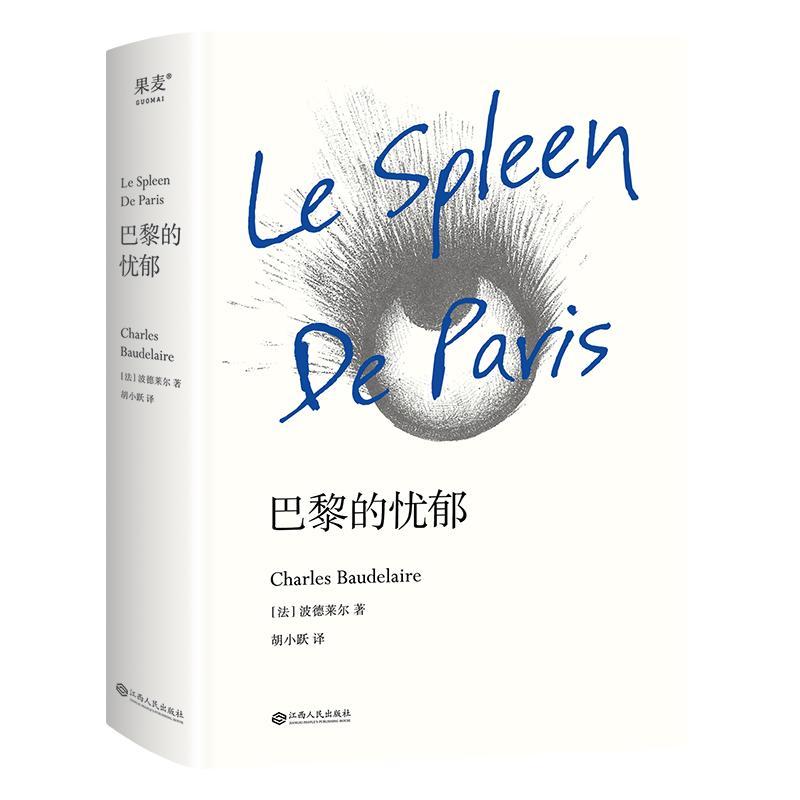WULOLIFE
《巴黎的忧郁》作者: [法]波德莱尔 出版社: 江西人民出版社 译者: 胡小跃
《巴黎的忧郁》作者: [法]波德莱尔 出版社: 江西人民出版社 译者: 胡小跃
Couldn't load pickup availability
Description
内容简介 · · · · · ·
【内容简介】
巴黎的忧郁(法国文化部“文艺骑士”勋章获得者胡小跃翻译;关于巴黎、街头、情欲、不满、毁灭,“它渺小而孤独,恰似我不可救药的人生。”兰波、芥川龙之介、太宰治、艾略特一致推崇。)
《巴黎的忧郁》收录了波德莱尔五部散文诗著作,包括《巴黎的忧郁》50篇、《杂诗集》2 5篇、《赤裸的心》70篇、《可怜的比利时》33篇、《比利时讽刺集》22篇。由法国文化不满、毁灭……忧郁的基调、愤世嫉俗的悲观主义情绪笼罩全书,“它渺小而孤独,恰似我不可救药的人生。”
在欧美各国,波德莱尔被推崇为法国文学史最重要的诗人,尤其是自20世纪以来,波德莱尔受到了各国文学界和波德莱尔是“现代所有国家中诗人的楷模”。作为法国象征派诗歌先驱、现代派文学奠基者,波德莱尔文风深深影响了兰波、波德莱尔是一位真正的上帝”,芥川写下名句“人生不如一行波德莱尔”,太宰治那句“生而为人,对不起”,更是深得波德莱尔真传。
的所见所闻所思以及幻想:他看见孤独的老妪却吓得婴儿大哭大叫;两个穷孩子为一块面包而争得你死我活;波德莱所以他借驴子与人的故事辛辣地讽刺那种奴颜婢膝的民族性;他与这个城市格格不入,在这个城市中处处感到孤独,“我没有父亲,没有母亲,没有姐妹,也没有兄弟”。他像公园中的一尊雕像,“没有爱情,也没有友谊”,孤独而伤心。他想离开这个城市,“到那个宁静、梦幻般美丽的理想乐土上去” 。 “一块富饶、美丽、充满希望的陆地”上去,“哪儿都行,只要在这个世界以外”……
波德莱尔发现了现代都市人独有的“疏离感”。 19世纪的巴黎已是发达资本主义大都市,“人们每天遭遇这么多人,彼此只照面而并不攀谈,彼此不了解对方,而又必须安然处在一起。 出身优越的波德莱尔,以冷眼和放浪对抗群体堕落,在都市妓女、流浪者、拾垃圾者那里,找到了微妙的亲近感。
【编辑推荐】
“做个有用的人,我一直觉得这很可恶。”
——波德莱尔
波德莱尔涉猎广泛,油画、素描、雕塑,艺术造诣颇高,这让他在描述巴黎街景时娓娓道来,精辟又不乏热情。他拒绝伪善,因此常常感到孤独和忧郁,在人群中感受更明显。那种稍纵即逝、孤寂而又有一些焦虑的心情,字里行间总能找到深深的共鸣:
关于“人生”:
恰似我不可救药的人生。
人生是一座医院,每一个病人都想调换床位。这一位宁愿面对火炉受苦,那一位觉得靠近窗口才能康复。
永久的惩罚又算得了什么呢!
关于“疏离”
不是每个人都能合群的,享受合群是一种艺术;
人群,是两个相等而可以对调的词汇。
不懂得与众人分享自己孤独的人,也不会懂得在忙碌的人群中保持自己的孤独。
关于“孤独”
孤独可能只对那些无所事事、放荡不羁的人才是危险的,因为这些人用激情和幻想来充实孤独。
我们所有的不幸都是由于不能待在自己的房间里所造成的。
人在心中总是对献身有一种不可避免的爱好,从中产生了对孤独的恐惧。
在他人的肉体中忘却自我,就是男人们高雅的所谓“爱的需要”。
关于“爱情”
爱情是想摆脱自身,与受自己害的人融为一体,就但它想保留战胜者的特权。
有些女人让人想去战胜她们、享受她们,可这位女性却使人想在她的目光下慢慢地死亡。
爱情唯一而崇高的快乐在于确信自己在作恶。——男人和女人生来就知道恶存在于所有的快乐之中。
关于“人性”
别小看任何人的感觉。人的感觉就是他的才能。
我明白,人们抛弃一个理由,想看看使用另一个理由能感受到什么。
轮换着成为受害者和刽子手也许会很愉快。
本书由荣获法国“文艺骑士”勋章的翻译家胡小跃依据The Spleen of Paris(Flammarion 1980年版)和 Rockets, My heart laid bare, Belgium undressed, Amoenitates Belgicae (Gallimard Collection Folio, number 1727, 1986)
【名人推荐】
“波德莱尔是第一位慧眼者,是诗人之王,一个真正的上帝。”
——(法)兰波
“人生不如一行波德莱尔。”
——(日)芥川龙之介
“波德莱尔是现代所有诗人的楷模。”
——(美)TS艾略特
作者简介 · · · · · ·
作者
(法)波德莱尔
Baudelaire
1821-1867
法国象征派诗歌先驱,现代派文学奠基者。
集《巴黎的忧郁》、诗集《恶之花》、艺术评论集《美学珍玩》等。
译者
胡小跃
法语译审,中国翻译家协会专家会员,中国作家协会会员。
2002
2010
主要译著有《乌合之众》《八十天环游地球》《巴黎的忧郁》等。
